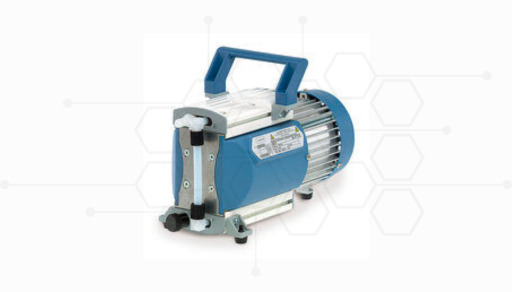In the realm of the laboratory, where precise and controlled environments are crucial for scientific research and experiments, the vacuum pump plays a pivotal role. So what exactly are they, and how do they work? These indispensable devices create a vacuum by removing air and gases from closed systems, enabling researchers to manipulate samples and conduct experiments with accuracy.
In this article, we’ll explore the various types of laboratory vacuum pumps and their applications, unravelling the secrets behind this essential technology. From rotary vane pumps to diaphragm pumps and everything in between, we’ll cover the features and outline how they are used in different scientific fields.
Join us as we embark on this exciting journey into the intriguing realm of laboratory vacuum pumps!
Diaphragm vacuum pumps are a popular choice in laboratories because of their oil-free and quiet operation. They employ a flexible diaphragm that moves up and down to create a vacuum. These pumps are ideal for applications where contamination from oil vapour is a concern, making them suitable for analytical instruments, rotary evaporators, and filtration setups.
Rotary Vane Vacuum Pumps are renowned for their robust construction and reliability, rotary vane vacuum pumps are widely used in laboratory applications. They utilise vanes to create a vacuum, making them suitable for low and medium vacuum levels. Rotary vane pumps are commonly employed in freeze-drying, vacuum ovens, and general laboratory vacuum applications.
Scroll vacuum pumps are noteable for not only being oil-free, but also hydrocarbon free, making them a more environmentally friendly option. These pumps use two interlocking scroll elements to create a vacuum. Their oil-free operation and low noise levels make them ideal for sensitive laboratory applications.
For high vacuum applications in laboratories, diffusion vacuum pumps are the go-to choice. These pumps operate based on vapour diffusion, and are capable of achieving ultra-high vacuum levels. Diffusion pumps are commonly used in mass spectrometers, electron microscopes, and other high-vacuum analytical instruments.
Turbo molecular vacuum pumps are another type of high vacuum pump that operates at ultra-high speeds, typically using turbine blades. These pumps are suitable for applications requiring extremely high vacuum levels, such as semiconductor manufacturing.
Venturi vacuum pumps, also known as ejector pumps, utilise compressed air or gas to create a vacuum. They are compact, easy to use, and suitable for applications where electricity is not available or where portability is essential. Venturi pumps are used for vacuum filtration.
Choosing the Right Vacuum Pump
Selecting the appropriate vacuum pump for a laboratory application depends on factors such as the required pumping speed, and the presence of oil or contamination-sensitive samples. Careful consideration of these parameters ensures the optimal performance and longevity of the chosen vacuum pump.
Maintenance and Best Practices
To maintain the efficiency and reliability of laboratory vacuum pumps, regular maintenance is essential. This includes changing oil (for pumps that require it), cleaning filters, and ensuring proper lubrication. Additionally, following the manufacturer’s guidelines and best practices is crucial for safe and efficient operation.
Harnessing the Power of Laboratory Vacuum Pumps
As laboratories continue to push the boundaries of scientific discovery, laboratory vacuum pumps remain indispensable tools for creating controlled environments. Each type of vacuum pump serves a specific purpose, catering to the diverse needs of researchers and professionals in various scientific fields. By understanding the different types of laboratory vacuum pumps and their applications, scientists can fully embrace the power of vacuum technology, revolutionising research and exploration.
Among our extensive catalogue of lab supplies, we offer a variety of laboratory vacuum pumps. Look through our products or contact us – we’ll be more than happy to guide you in selecting a laboratory vacuum pump that meets your needs.


